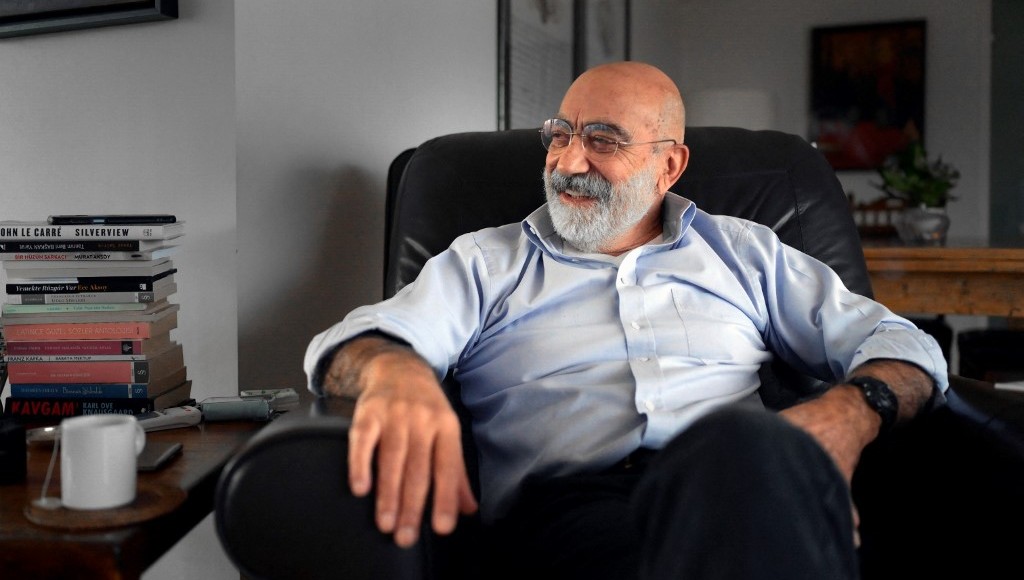Freed after nearly five years in jail for alleged involvement in a failed coup, Turkish journalist and author Ahmet Altan, 71, now counts his time by the number of books he has left to write.
Celebrated in the West — particularly Germany and France, where he won literary prizes while still behind bars — Altan remains in a tricky situation back home, where he faces the threat of further prosecution.
But speaking to AFP in his İstanbul flat, Altan said he would rather spend his last days in a Turkish prison “where I spoke my native language” than be a free man in exile, where “you are nearly no one (and) have no roots.”
“Writers are very anxious because every minute is a minute that you can write, you can do your job, so every minute that you don’t write, you feel regret,” he said in fluent English.
“I feel it now much more than before prison,” he confided, ensconced in a black leather chair flanked by stacks of books.
‘Revenge’
Altan, who has sold nearly seven million books worldwide, was one of tens of thousands of Turks jailed or fired from their jobs in purges that followed a 2016 coup attempt against President Recep Tayyip Erdoğan.
The soft-spoken intellectual was locked up in Silivri, an İstanbul prison complex fitted out with Turkey’s largest courtroom — the main venue for mass trials that saw more than 2,500 suspects jailed for life.
Altan was partially singled out for his work with Taraf, a newspaper he founded. The government closed the paper on allegations it had obtained financial backing from a US-based Muslim cleric Erdoğan blames for the coup plot.
Released less than half way through his 10.5-year sentence last April by order of the European Court of Human Rights, which found “no evidence” of wrongdoing, Altan returned to his family having written two more books in jail and nearly completed a third.
The first, a prison memoir called “I Will Never See the World Again”, was translated into 28 languages but never published in Turkey.
He describes the second, a novel called “Lady Life”, as an ode to freedom and his personal “revenge.”
It became a best-seller in Turkey after his release, scooping up France’s Prix Femina foreign book prize in 2021.
“It’s kind of saying, ‘you couldn’t steal those five years from me’,” the silver-bearded writer said of the novel, between cigarette puffs.
He recalled writing “eight or nine hours a day”, while his two cellmates nagged him about the endless cigarette smoke.
‘Exile would be harder’
One day in prison he stumbled across FlashTV, a “low-end” channel that showed voluptuous women singing and dancing in skimpy dresses.
“They were the only ladies I could see while in prison… I really liked to watch it but my cellmates were very religious,” laughed Altan, who describes himself as an atheist who is passionate about religion.
“Lady Life”, a story of a literature student who falls in love with two sensuous women, “came in this atmosphere”, he said.
“I lived in some other world,” he said. “If you can write, there is nothing to complain about.”
Altan’s jailing sparked international outrage, turning him into a symbol of oppression in Turkey after the coup attempt.
Thirty-eight Nobel laureates — including JM Coetzee and Kazuo Ishiguro — published a letter in Britain’s Guardian newspaper in 2018 calling on Erdoğan to secure the writer’s release.
Aware of his high profile and the new court proceedings he faces, Altan shies away from answering overtly political questions today.
But while he vows to publish his future books abroad before trying his luck at home, Altan sounds resolute about staying in Turkey, no matter what.
“It’s not because of courage. But being in exile is something I believe is harder than being a prisoner,” he said.
In exile, “you may be safe and secure … but you cannot feel like you are (sleeping) in your own bed, in your own home. I’d rather be in prison.”
AFP

